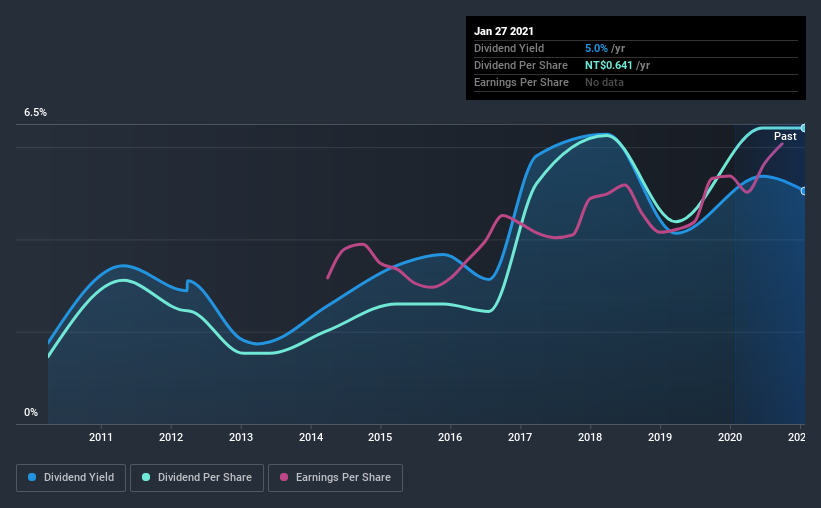- Taiwan
- /
- Capital Markets
- /
- TWSE:2889
Should IBF Financial Holdings Co., Ltd. (TPE:2889) Be Part Of Your Dividend Portfolio?
Is IBF Financial Holdings Co., Ltd. (TPE:2889) a good dividend stock? How can we tell? Dividend paying companies with growing earnings can be highly rewarding in the long term. If you are hoping to live on the income from dividends, it's important to be a lot more stringent with your investments than the average punter.
A high yield and a long history of paying dividends is an appealing combination for IBF Financial Holdings. It would not be a surprise to discover that many investors buy it for the dividends. Some simple research can reduce the risk of buying IBF Financial Holdings for its dividend - read on to learn more.
Explore this interactive chart for our latest analysis on IBF Financial Holdings!

Payout ratios
Dividends are typically paid from company earnings. If a company pays more in dividends than it earned, then the dividend might become unsustainable - hardly an ideal situation. So we need to form a view on if a company's dividend is sustainable, relative to its net profit after tax. IBF Financial Holdings paid out 62% of its profit as dividends, over the trailing twelve month period. This is a healthy payout ratio, and while it does limit the amount of earnings that can be reinvested in the business, there is also some room to lift the payout ratio over time.
Remember, you can always get a snapshot of IBF Financial Holdings' latest financial position, by checking our visualisation of its financial health.
Dividend Volatility
One of the major risks of relying on dividend income, is the potential for a company to struggle financially and cut its dividend. Not only is your income cut, but the value of your investment declines as well - nasty. IBF Financial Holdings has been paying dividends for a long time, but for the purpose of this analysis, we only examine the past 10 years of payments. This dividend has been unstable, which we define as having been cut one or more times over this time. During the past 10-year period, the first annual payment was NT$0.1 in 2011, compared to NT$0.6 last year. Dividends per share have grown at approximately 16% per year over this time. The growth in dividends has not been linear, but the CAGR is a decent approximation of the rate of change over this time frame.
So, its dividends have grown at a rapid rate over this time, but payments have been cut in the past. The stock may still be worth considering as part of a diversified dividend portfolio.
Dividend Growth Potential
With a relatively unstable dividend, it's even more important to evaluate if earnings per share (EPS) are growing - it's not worth taking the risk on a dividend getting cut, unless you might be rewarded with larger dividends in future. It's good to see IBF Financial Holdings has been growing its earnings per share at 15% a year over the past five years. Earnings per share have been growing rapidly, but given that it is paying out more than half of its earnings as dividends, we wonder how IBF Financial Holdings will keep funding its growth projects in the future.
Conclusion
To summarise, shareholders should always check that IBF Financial Holdings' dividends are affordable, that its dividend payments are relatively stable, and that it has decent prospects for growing its earnings and dividend. First, we think IBF Financial Holdings has an acceptable payout ratio. Next, earnings growth has been good, but unfortunately the dividend has been cut at least once in the past. In summary, we're unenthused by IBF Financial Holdings as a dividend stock. It's not that we think it is a bad company; it simply falls short of our criteria in some key areas.
Investors generally tend to favour companies with a consistent, stable dividend policy as opposed to those operating an irregular one. Meanwhile, despite the importance of dividend payments, they are not the only factors our readers should know when assessing a company. Just as an example, we've come accross 2 warning signs for IBF Financial Holdings you should be aware of, and 1 of them is a bit unpleasant.
We have also put together a list of global stocks with a market capitalisation above $1bn and yielding more 3%.
If you decide to trade IBF Financial Holdings, use the lowest-cost* platform that is rated #1 Overall by Barron’s, Interactive Brokers. Trade stocks, options, futures, forex, bonds and funds on 135 markets, all from a single integrated account. Promoted
New: AI Stock Screener & Alerts
Our new AI Stock Screener scans the market every day to uncover opportunities.
• Dividend Powerhouses (3%+ Yield)
• Undervalued Small Caps with Insider Buying
• High growth Tech and AI Companies
Or build your own from over 50 metrics.
This article by Simply Wall St is general in nature. It does not constitute a recommendation to buy or sell any stock, and does not take account of your objectives, or your financial situation. We aim to bring you long-term focused analysis driven by fundamental data. Note that our analysis may not factor in the latest price-sensitive company announcements or qualitative material. Simply Wall St has no position in any stocks mentioned.
*Interactive Brokers Rated Lowest Cost Broker by StockBrokers.com Annual Online Review 2020
Have feedback on this article? Concerned about the content? Get in touch with us directly. Alternatively, email editorial-team (at) simplywallst.com.
About TWSE:2889
IBF Financial Holdings
Through its subsidiaries, provides various financial products and services for individual and corporate clients primarily in Taiwan.
Second-rate dividend payer with very low risk.
Similar Companies
Market Insights
Community Narratives



